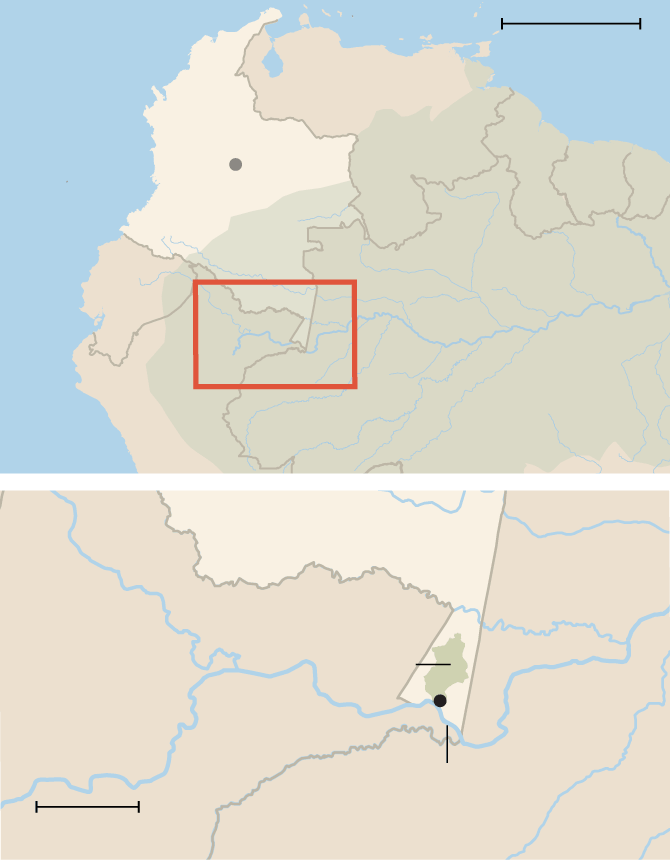With the help of a small rope tied around his ankles, Eugenio Sánchez, lithe at age 50, shimmied himself all the way up a towering tree like a human inchworm, his chest heaving from the exertion, just to pick a few leaves.
Listen to this article with reporter commentary
The leaves, found only on the highest branches, would help the scientists waiting below identify the species. And that, along with the tree’s exact size (or at least as close as one can approximate a tree’s size) would tell them something very important: how much carbon it contained.
The team, wearing gumboots caked with mud, were at the beginning of a monthslong process of painstakingly measuring pretty much every woody plant growing on this patch of Amazon rainforest in Colombia, one by one. A census of all 125,000 individual plants with a trunk size at least a centimeter in diameter.
It is part of a new, multimillion-dollar effort in dozens of patches of forest across the world that’s aimed at figuring out, to an unprecedented degree of precision, the extent to which forests perform an epic service to humanity by capturing and locking away huge amounts of carbon dioxide, the main planet-warming greenhouse gas.
The Amazon is vast. Nearly 10 Texases would fit in it. Amid that emerald expanse, this infinitesimal patch, less than a tenth of a square mile, is a stand-in for the larger whole. As a representative sample of the northwestern part of the Amazon, it contains around 1,200 species of woody plants, from gigantic kapok trees to tightly coiled liana vines. All of that in the space of six or seven New York City blocks.
#g-CLI-AMAZON1map-box ,
#g-CLI-AMAZON1map-box .g-artboard {
margin:0 auto;
}
#g-CLI-AMAZON1map-box .g-aiAltText {
position: absolute;
left: -10000px;
width: 1px;
height: 1px;
overflow: hidden;
white-space: nowrap;
}
#g-CLI-AMAZON1map-box p {
margin:0;
}
#g-CLI-AMAZON1map-box .g-aiAbs {
position:absolute;
}
#g-CLI-AMAZON1map-box .g-aiImg {
position:absolute;
top:0;
display:block;
width:100% !important;
}
#g-CLI-AMAZON1map-box .g-aiSymbol {
position: absolute;
box-sizing: border-box;
}
#g-CLI-AMAZON1map-box .g-aiPointText p { white-space: nowrap; }
#g-CLI-AMAZON1map-Artboard_9 {
position:relative;
overflow:hidden;
}
#g-CLI-AMAZON1map-Artboard_9 p {
font-family:nyt-franklin,arial,helvetica,sans-serif;
font-weight:700;
line-height:14px;
height:auto;
opacity:1;
mix-blend-mode:normal;
letter-spacing:0.035em;
font-size:13px;
text-align:left;
text-transform:none;
color:rgb(0,0,0);
top:1px;
position:static;
padding-bottom:0;
padding-top:0;
font-style:normal;
}
#g-CLI-AMAZON1map-Artboard_9 .g-pstyle0 {
font-weight:500;
line-height:9px;
height:9px;
mix-blend-mode:multiply;
letter-spacing:0.125em;
font-size:10px;
text-align:center;
text-transform:uppercase;
top:0.8px;
position:relative;
}
#g-CLI-AMAZON1map-Artboard_9 .g-pstyle1 {
font-family:nyt-cheltenham,georgia,serif;
font-style:italic;
height:14px;
mix-blend-mode:multiply;
letter-spacing:0em;
font-size:14px;
text-align:center;
color:rgb(98,140,178);
}
#g-CLI-AMAZON1map-Artboard_9 .g-pstyle2 {
font-weight:500;
line-height:18px;
height:18px;
mix-blend-mode:multiply;
letter-spacing:0em;
font-size:15px;
color:rgb(102,102,102);
top:1.2px;
position:relative;
}
#g-CLI-AMAZON1map-Artboard_9 .g-pstyle3 {
font-weight:500;
line-height:17px;
height:17px;
opacity:0.75;
mix-blend-mode:multiply;
letter-spacing:0em;
font-size:14px;
text-align:right;
color:rgb(102,102,102);
top:1.1px;
position:relative;
}
#g-CLI-AMAZON1map-Artboard_9 .g-pstyle4 {
font-weight:500;
line-height:18px;
height:18px;
mix-blend-mode:multiply;
letter-spacing:0.02em;
font-size:15px;
top:1.2px;
position:relative;
}
#g-CLI-AMAZON1map-Artboard_9 .g-pstyle5 {
font-weight:500;
line-height:13px;
height:13px;
mix-blend-mode:multiply;
letter-spacing:0.015em;
font-size:11px;
text-align:center;
text-transform:uppercase;
top:0.9px;
position:relative;
}
#g-CLI-AMAZON1map-Artboard_9 .g-pstyle6 {
font-family:nyt-cheltenham,georgia,serif;
font-style:italic;
line-height:15px;
height:15px;
mix-blend-mode:multiply;
letter-spacing:0em;
font-size:14px;
text-align:center;
color:rgb(98,140,178);
}
#g-CLI-AMAZON1map-Artboard_9 .g-pstyle7 {
font-weight:500;
line-height:18px;
height:18px;
mix-blend-mode:multiply;
letter-spacing:0.02em;
font-size:15px;
color:rgb(102,102,102);
top:1.2px;
position:relative;
}
#g-CLI-AMAZON1map-Artboard_9 .g-pstyle8 {
height:14px;
mix-blend-mode:multiply;
letter-spacing:0em;
position:relative;
}
#g-CLI-AMAZON1map-Artboard_9 .g-pstyle9 {
font-weight:500;
line-height:18px;
height:18px;
mix-blend-mode:multiply;
letter-spacing:0em;
font-size:15px;
top:1.2px;
position:relative;
}
#g-CLI-AMAZON1map-Artboard_9 .g-pstyle10 {
height:14px;
mix-blend-mode:multiply;
text-align:right;
text-transform:uppercase;
position:relative;
}
